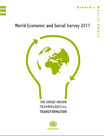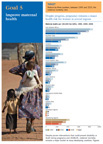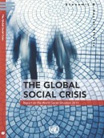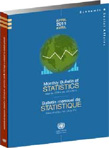Launch of the World Economic and Social Survey 2011: The Great Green Technological Transformation
 The report to be released in Geneva on 5 July, states that over the next 40 years, $1.9 trillion per year will be needed for incremental investments in green technologies. At least one half or $1.1 trillion per year, of the required investments will need to be made in developing countries to meet their rapidly increasing food and energy demand through the application of green technologies.
The report to be released in Geneva on 5 July, states that over the next 40 years, $1.9 trillion per year will be needed for incremental investments in green technologies. At least one half or $1.1 trillion per year, of the required investments will need to be made in developing countries to meet their rapidly increasing food and energy demand through the application of green technologies.
“This report shows how important technological progress will be for ensuring a future that benefits everyone while protecting our planet,” says Sha Zukang, Under-Secretary-General of DESA and the Secretary-General of the UN Conference on Sustainable Development, Rio+20, to take place in June 2012 in Rio de Janeiro. “The report is required reading as we gear up for Rio+20, which is an opportunity to define pathways to a safer, cleaner and more prosperous world for all.”
For more information: http://www.un.org/en/development/desa/policy/wess/index.shtml
The World Economic and Social Survey (WESS) 2011 is also available on the following ebook readers:
Kindle: http://www.amazon.com/dp/B00580V4KW
Apple iBookstore: forthcoming
Launch of the Millennium Development Goals Report 2011

The report to be released on 7 July is the result of an intensively collaborative effort, led by the Statistics Division of DESA. It involves twenty-seven international organizations and agencies and a group of representatives of national statistical systems, who meet every year to review the tools to compile and analyze the necessary data. These data are drawn from national statistics provided by Governments to the international statistical system and adjusted for comparability.
The report will present the most updated assessment of progress towards the MDGs. It will be a key resource in informing the political debate at ECOSOC and at the General Assembly in September when Member States will come together to assess what has worked in accelerating progress and what needs to be done to bridge existing gaps.
For more information: http://mdgs.un.org
Report on the World Social Situation 2011: The Global Social Crisis

The report reveals that many governments did not pay sufficient attention to the social implications of the global economic crisis. It states that economic policies considered in isolation from their social consequences often create dire results for people’s nutrition, health and education, which adversely affect long-term economic growth.
“The economic crisis reminds us that it is essential for people to be healthy, educated, adequately housed and well fed to be more productive and better able to contribute to society,” said Jomo Kwame Sundaram, UN-DESA Assistant Secretary-General for Economic Development.
Recovery has been uneven and still remains fragile, and, the report says, wide-ranging negative social outcomes linger from the global economic downturn.
For more information: http://social.un.org/index/ReportontheWorldSocialSituation/2011.aspx
Statistical compilations
Monthly Bulletin of Statistics and MBS Online

The Monthly Bulletin of Statistics presents current economic and social statistics for more than 200 countries and territories of the world. It contains over 50 tables of monthly and/or annual and quarterly data on a variety of subjects illustrating important economic trends and developments, including population, prices, employment and earnings, energy, manufacturing, transport, construction, international merchandise trade and finance.
Vol. LXV – No. 5, May 2011
This month, the following tables, which are featured in the MBS on a quarterly or bimonthly basis, are presented along with the regular recurrent monthly tables: Earnings in manufacturing, by sex and Total exports and imports by regions: volume and unit value indices and terms of trade.
For more information: http://unstats.un.org/unsd/mbs
Newsletters
Rio+20: Making it Happen
The latest issue of the newsletter, Volume 2, Issue 11, features activities marking the one year count-down to Rio+20 in both New York and Rio de Janeiro. With other events and issues highlighted, it also announces the three-day High-level Dialogue on Institutional Framework for Sustainable Development to be held on 19-21 July, in Solo, Central Java, Indonesia.
View full issue at: http://www.uncsd2012.org/rio20/index.php?menu=14
Working papers
Food Crises and Gender Inequality
This paper examines the current food crises, the projected effect of climate change, the vulnerabilities created by regional concentrations of food production, imports and exports, and the significant role of women as food producers, consumers and family food managers. Bridging productivity differentials between male and female farmers, by helping women overcome production constraints, would significantly increase agricultural output. This becomes an imperative, given the feminization of agriculture. Institutionally, a group approach to farming would help women and other small holders enhance their access to land and inputs, benefit from economies of scale, and increase their bargaining power economically and socially.
For more information: http://www.un.org/esa/desa/papers/2011/wp107_2011.pdf
The Scorecard on Development, 1960-2010: Closing the Gap?
This paper examines data on economic growth and various social indicators for 193 countries over the past 50 years, divided into three periods: 1960-1980, 1980-2000, and 2000-2010. The paper finds that after a sharp slowdown in economic growth and in progress on social indicators during the second period (1980-2000), there has been a recovery on both economic growth and, for many countries, a rebound in progress on social indicators (including life expectancy, adult, infant, and child mortality, and education) during the past decade. The paper discusses some of the economic and policy changes that might explain the slowdown and rebound.
For more information: http://www.un.org/esa/desa/papers/2011/wp106_2011.pdf
Discussion papers
Monthly Briefing on the World Economic Situation and Prospects
The United Nations forecast for growth of the global economy was increased slightly to 3.3 per cent in 2011 and 3.6 per cent in 2012. However, the pace of the global recovery remains uneven across countries. Output growth is strong among developing countries and feeble in many developed economies.
Serious downside risks to the global recovery remain. Developed economies face continued financial sector fragility, sovereign debt distress and high unemployment rates. Many developing countries face new headwinds, including rising inflation, assets bubble risks and strong exchange rate appreciation.
For more information: http://www.un.org/esa/policy/publications/dpad_wespmbn.html
Publications in other languages
The following publications are now available in other languages:
- Handbook on Population and Housing Census Editing Revision 1, ST/ESA/STAT/SER. F/82/Rev.1 (Chinese, Spanish)
- International Recommendations for Tourism Statistics, ST/ESA/STAT/SER. M/83/Rev.1 (Chinese)
For more information: http://unstats.un.org/unsd/pubs/
